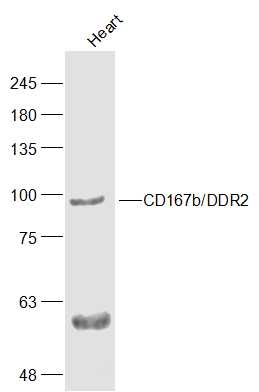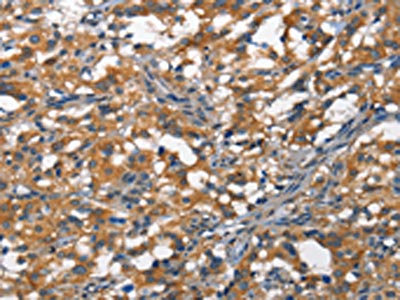![Non-transfected (–) and transfected (+) 293T whole cell extracts (30 μg) were separated by 7.5% SDS-PAGE, and the membrane was blotted with DDR2 antibody [HL1107] (GTX636322) diluted at 1:500000. The HRP-conjugated anti-rabbit IgG antibody (GTX213110-01) was used to detect the primary antibody. Non-transfected (–) and transfected (+) 293T whole cell extracts (30 μg) were separated by 7.5% SDS-PAGE, and the membrane was blotted with DDR2 antibody [HL1107] (GTX636322) diluted at 1:500000. The HRP-conjugated anti-rabbit IgG antibody (GTX213110-01) was used to detect the primary antibody.](https://www.genetex.com/upload/website/prouct_img/normal/GTX636322/GTX636322_44417_20220819_WB_B_22082402_572.webp)
Non-transfected (–) and transfected (+) 293T whole cell extracts (30 μg) were separated by 7.5% SDS-PAGE, and the membrane was blotted with DDR2 antibody [HL1107] (GTX636322) diluted at 1:500000. The HRP-conjugated anti-rabbit IgG antibody (GTX213110-01) was used to detect the primary antibody.
DDR2 antibody [HL1107]
GTX636322
ApplicationsWestern Blot, ImmunoHistoChemistry, ImmunoHistoChemistry Paraffin
Product group Antibodies
ReactivityHuman, Mouse, Rat
TargetDDR2
Overview
- SupplierGeneTex
- Product NameDDR2 antibody [HL1107]
- Delivery Days Customer9
- Application Supplier NoteWB: 1:500-1:3000. *Optimal dilutions/concentrations should be determined by the researcher.Not tested in other applications.
- ApplicationsWestern Blot, ImmunoHistoChemistry, ImmunoHistoChemistry Paraffin
- CertificationResearch Use Only
- ClonalityMonoclonal
- Clone IDHL1107
- Concentration1 mg/ml
- ConjugateUnconjugated
- Gene ID4921
- Target nameDDR2
- Target descriptiondiscoidin domain receptor tyrosine kinase 2
- Target synonymsMIG20a, NTRKR3, TKT, TYRO10, WRCN, discoidin domain-containing receptor 2, CD167 antigen-like family member B, cell migration-inducing protein 20, discoidin domain receptor 2, discoidin domain receptor family, member 2, discoidin domain-containing receptor tyrosine kinase 2, hydroxyaryl-protein kinase, migration-inducing gene 16 protein, neurotrophic tyrosine kinase receptor related 3, receptor protein-tyrosine kinase TKT, tyrosine-protein kinase TYRO10
- HostRabbit
- IsotypeIgG
- Protein IDQ16832
- Protein NameDiscoidin domain-containing receptor 2
- Scientific DescriptionThis gene encodes a member of the discoidin domain receptor subclass of the receptor tyrosine kinase (RTKs) protein family. RTKs play a key role in the communication of cells with their microenvironment. The encoded protein is a collagen-induced receptor that activates signal transduction pathways involved in cell adhesion, proliferation, and extracellular matrix remodeling. This protein is expressed in numerous cell types and may alos be involved in wound repair and regulate tumor growth and invasiveness. Mutations in this gene are the cause of short limb-hand type spondylometaepiphyseal dysplasia. [provided by RefSeq, Aug 2017]
- ReactivityHuman, Mouse, Rat
- Storage Instruction-20°C or -80°C,2°C to 8°C
- UNSPSC12352203

![Various tissue extracts (50 μg) were separated by 7.5% SDS-PAGE, and the membrane was blotted with DDR2 antibody [HL1107] (GTX636322) diluted at 1:1000. The HRP-conjugated anti-rabbit IgG antibody (GTX213110-01) was used to detect the primary antibody. Various tissue extracts (50 μg) were separated by 7.5% SDS-PAGE, and the membrane was blotted with DDR2 antibody [HL1107] (GTX636322) diluted at 1:1000. The HRP-conjugated anti-rabbit IgG antibody (GTX213110-01) was used to detect the primary antibody.](https://www.genetex.com/upload/website/prouct_img/normal/GTX636322/GTX636322_44417_20210827_WB_M_R_w_23061202_729.webp)
![Various whole cell extracts (30 μg) were separated by 7.5% SDS-PAGE, and the membrane was blotted with DDR2 antibody [HL1107] (GTX636322) diluted at 1:1000. The HRP-conjugated anti-rabbit IgG antibody (GTX213110-01) was used to detect the primary antibody. Various whole cell extracts (30 μg) were separated by 7.5% SDS-PAGE, and the membrane was blotted with DDR2 antibody [HL1107] (GTX636322) diluted at 1:1000. The HRP-conjugated anti-rabbit IgG antibody (GTX213110-01) was used to detect the primary antibody.](https://www.genetex.com/upload/website/prouct_img/normal/GTX636322/GTX636322_T-44368_20210827_WB_KO_watermark_w_23061202_688.webp)
![U87-MG whole cell and membrane extracts (5 μg) were separated by 5% SDS-PAGE, and the membrane was blotted with DDR2 antibody [HL1107] (GTX636322) diluted at 1:10000. The HRP-conjugated anti-rabbit IgG antibody (GTX213110-01) was used to detect the primary antibody. U87-MG whole cell and membrane extracts (5 μg) were separated by 5% SDS-PAGE, and the membrane was blotted with DDR2 antibody [HL1107] (GTX636322) diluted at 1:10000. The HRP-conjugated anti-rabbit IgG antibody (GTX213110-01) was used to detect the primary antibody.](https://www.genetex.com/upload/website/prouct_img/normal/GTX636322/GTX636322_44998_20230428_WB_Fraction_24080602_734.webp)
![DDR2 antibody [HL1107] detects DDR2 protein by immunohistochemical analysis. Sample: Paraffin-embedded mouse tissues. DDR2 stained by DDR2 antibody [HL1107] (GTX636322) diluted at 1:16000. Antigen Retrieval: Tris-EDTA buffer, pH 9.0, 15 min DDR2 antibody [HL1107] detects DDR2 protein by immunohistochemical analysis. Sample: Paraffin-embedded mouse tissues. DDR2 stained by DDR2 antibody [HL1107] (GTX636322) diluted at 1:16000. Antigen Retrieval: Tris-EDTA buffer, pH 9.0, 15 min](https://www.genetex.com/upload/website/prouct_img/normal/GTX636322/GTX636322_45271_20250509_IHC-P_M_multiple_KPKM_1_25051420_108.webp)
![DDR2 antibody [HL1107] detects DDR2 protein by immunohistochemical analysis. Sample: Paraffin-embedded mouse testis. DDR2 stained by DDR2 antibody [HL1107] (GTX636322) diluted at 1:16000. Antigen Retrieval: Tris-EDTA buffer, pH 9.0, 15 min DDR2 antibody [HL1107] detects DDR2 protein by immunohistochemical analysis. Sample: Paraffin-embedded mouse testis. DDR2 stained by DDR2 antibody [HL1107] (GTX636322) diluted at 1:16000. Antigen Retrieval: Tris-EDTA buffer, pH 9.0, 15 min](https://www.genetex.com/upload/website/prouct_img/normal/GTX636322/GTX636322_45271_20250509_IHC-P_M_25051420_752.webp)
![DDR2 antibody [HL1107] detects DDR2 protein by immunohistochemical analysis. Sample: Paraffin-embedded mouse tissues. DDR2 stained by DDR2 antibody [HL1107] (GTX636322) diluted at 1:16000. Antigen Retrieval: Tris-EDTA buffer, pH 9.0, 15 min DDR2 antibody [HL1107] detects DDR2 protein by immunohistochemical analysis. Sample: Paraffin-embedded mouse tissues. DDR2 stained by DDR2 antibody [HL1107] (GTX636322) diluted at 1:16000. Antigen Retrieval: Tris-EDTA buffer, pH 9.0, 15 min](https://www.genetex.com/upload/website/prouct_img/normal/GTX636322/GTX636322_45271_20250509_IHC-P_M_multiple_KPKM_2_25051420_603.webp)






